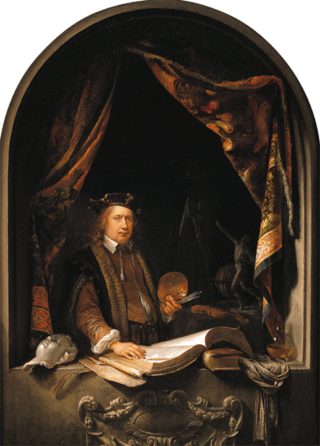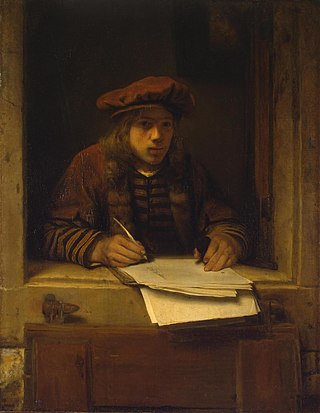Geertruy Haeck-van Slingelandt van der Tempel | |
|---|---|
 Geertruy Haeck venerating St Agnes | |
| Occupation | canoness regular |
| Years active | mid-15th century |
Geertruy Haeck-van Slingelandt van der Tempel was a 15th-century Dutch patrician woman.
Geertruy Haeck-van Slingelandt van der Tempel | |
|---|---|
 Geertruy Haeck venerating St Agnes | |
| Occupation | canoness regular |
| Years active | mid-15th century |
Geertruy Haeck-van Slingelandt van der Tempel was a 15th-century Dutch patrician woman.
Geertruy was married to Adriaen Hermansz. Haeck, [1] who served as mayor of Dordrecht 1443–44 and 1446–48. [2] After being widowed she entered the congregation of canonesses regular of St Agnes (Sint-Agnesklooster).
Around 1465 Haeck had her portrait painted kneeling in veneration of St Agnes. This portrait was bought by the Rijksmuseum, Amsterdam, in 1957 for £4,300. [3]

Gerrit Dou, also known as GerardDouw or Dow, was a Dutch Golden Age painter, whose small, highly polished paintings are typical of the Leiden fijnschilders. He specialised in genre scenes and is noted for his trompe-l'œil "niche" paintings and candlelit night-scenes with strong chiaroscuro. He was a student of Rembrandt.

Nicolaes Maes was a Dutch painter known for his genre scenes, portraits, religious compositions and the occasional still life. A pupil of Rembrandt in Amsterdam, he returned to work in his native city of Dordrecht for 20 years. In the latter part of his career he returned to Amsterdam where he became the leading portrait painter of his time. Maes contributed to the development of genre painting in the Netherlands and was the most prominent portrait painter working in Amsterdam in the final three decades of the 17th century.

Frans van Mieris the Elder, was a Dutch Golden Age genre and portrait painter. The leading member of a Leiden family of painters, his sons Jan (1660–1690) and Willem (1662–1747) and his grandson Frans van Mieris the Younger (1689–1763) were also accomplished genre painters.

Samuel Dirksz van Hoogstraten was a Dutch Golden Age painter, who was also a poet and author on art theory.

Bartholomeus van der Helst was a Dutch painter. Considered to be one of the leading portrait painters of the Dutch Golden Age, his elegant portraits gained him the patronage of Amsterdam's elite as well as the Stadtholder's circle. Besides portraits, van der Helst painted a few genre pictures as well as some biblical scenes and mythological subjects.

Ferdinand Bol was a Dutch painter, etcher and draftsman. Although his surviving work is rare, it displays Rembrandt's influence; like his master, Bol favored historical subjects, portraits, numerous self-portraits, and single figures in exotic finery.

Simon van Slingelandt, lord of the manor of Patijnenburg was an influential Dutch politician and diplomat during the 18th century. He served as the Grand Pensionary of Holland, the most important political position in the Republic of the Seven United Netherlands, from 17 July 1727 until his death on 1 December 1736. Van Slingelandt is often regarded as a capable and pragmatic administrator and an effective diplomat.

Jacob Adriaensz Backer was a Dutch Golden Age painter. He produced about 140 paintings in twenty years, including portraits, religious subjects, and mythological paintings. In his style, he was influenced by Wybrand de Geest, Rubens and Abraham Bloemaert. He is also noted for his drawings of male and female nudes.
Events from the year 1691 in art.

Arnold Houbraken was a Dutch painter and writer from Dordrecht, now remembered mainly as a biographer of Dutch Golden Age painters.

Aert Schouman or Aart Schouman was an 18th-century painter, now better known as a glass engraver, from the Dutch Republic.

Willem Adriaensz Key was a Flemish Renaissance painter.

Abraham van den Tempel was a Dutch Golden Age painter.

Pieter Cornelisz van Slingelandt was a Dutch Golden Age portrait painter who had been a pupil of Gerard Dou and is known as one of Leiden's fijnschilders.

Louis Bernard Coclers was a Southern Netherlandish portrait painter and engraver who worked mainly in Liège, Maastricht, Leiden and Amsterdam.
De Witt is the name of an old Dutch patrician and regenten family. Originally from Dordrecht, the genealogy of the family begins with Jan de Witte, a patrician who lived around 1295. The family have played an important role during the Dutch Golden Age. They were at the centre of Dordrecht and Holland oligarchy from the end of the 16th century until 1672, and belonged to the Dutch States Party.
Cornelis van Slingeland, was a Dutch Golden Age painter.

Equestrian Portrait of Cornelis and Michiel Pompe van Meerdervoort with Their Tutor and Coachman, also known as Starting for the Hunt, is an oil-on-canvas painting executed ca. 1652–53 by Aelbert Cuyp, now in the Metropolitan Museum of Art in New York.
Reinalda van Eymeren (1463–1540) was a religious sister in St Agnes Convent, Arnhem who has been proposed as the author of the highly influential, anonymous Middle Dutch spiritual text Die Evangelische Peerle, first published in 1535, and Vanden Tempel onser sielen, first published 1543.

Portrait of a Man is an oil-on-canvas painting by the Dutch artist Ferdinand Bol, from 1663. It is held in the Rijksmuseum in Amsterdam.